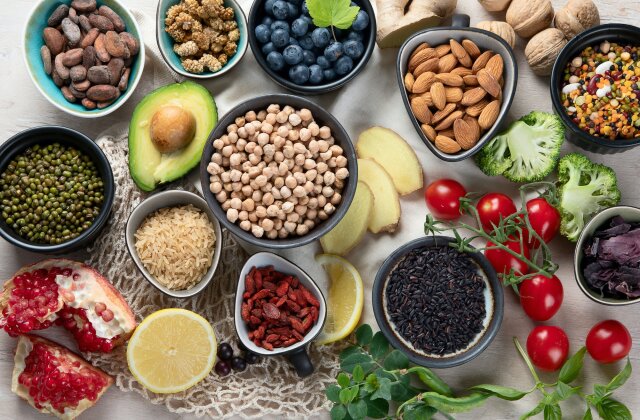Long, luscious, and healthy hair is everyone’s dream, particularly females. However, one’s hair growth is not dependent on just what you apply to it but many other factors including genetics, age, diet, and medications.
While some factors like genetics are beyond your control, one aspect you can control is your diet.
According to a study, you need nutrients including zinc, vitamins, and iron to grow that desired long, healthy hair. Incorporating foods rich in these nutrients not only supports hair growth and prevents loss but also enhances overall well-being.
So if you want that long, luscious, and healthy hair, here are foods you should add to your diet.
- Beans

Surprised? Well, beans are a great plant-based source of protein, which can help promote hair growth.
Beans provide many hair-healthy nutrients, including iron, zinc, biotin, and folate.
Biotin, also known as vitamin H, has been linked with hair as it helps in the production of the protein that grows and keeps the hair and nails healthy — keratin. According to research, biotin supplements can help in the growth and enhancement of healthy hair and nails.
Meanwhile, beans are highly versatile — which makes them an easy addition to your diet. You can pair it with almost everything including bread and plantain.
- Sweet potatoes

Sweet potatoes are one of the richest natural sources of beta carotene, a plant-based compound that is converted to vitamin A in your body.
Research has shown that vitamin A can affect the production of sebum, which helps keep hair healthy and the scalp moisturized.
Vitamin A is one of the important nutrients in growing healthy hair as its deficiency has been proven to cause hair loss.
So to avoid vitamin A deficiency, you can incorporate sweet potatoes in your diet because a medium-sized one can provide up to 160% of your daily vitamin A needs.
However, make sure your vitamin A intake is moderate. Too much intake of vitamin A can also lead to hair loss; be as moderate as possible.
- Avocados

Avocados are rich in healthy fats, vitamins E and C, and biotin.
Vitamin C and E are antioxidants that help prevent oxidative stress that may lead to hair loss.
Vitamin E also protects the scalp from oxidative stress and damage. A damaged scalp can result in poor hair quality and fewer hair follicles.
In a study, there was a 34.5% increase in hair growth in people with hair loss after taking a vitamin E supplement for 8 months.
Adding avocados to your diet will provide your body with these nutrients which will help nourish your scalp and hair, promoting elasticity and preventing hair breakage.
- Fatty fish

Fatty fish like salmon and mackerel are great foods to grow healthy hair due to their high level of protein, selenium, vitamin D3, and omega-3 fatty acids.
Omega-3 fatty acids particularly have been linked to improved hair growth and density.
In a study, women experienced reduced hair loss and increased hair density after 6 months of taking supplements omega-3 and antioxidants.
Omega-3 fatty acids prevent dryness and promote healthy scalp and overall hair health. If you want all of these, add fatty fish to your diet henceforth.
- Soybeans

Soybeans have been proven to contain compounds that can promote hair growth. One of these compounds is spermidine.
It has been found that spermidine can prolong a phase of active hair growth called the anagen phase. Meanwhile, the longer a hair follicle stays in the anagen phase, the longer it will grow.
Spermidine-based supplements can also help improve hair loss conditions.
So if you want a prolonged hair growth phase leading to long hair, incorporate soybeans into your diet.
- Dark leafy greens

Dark leafy greens are no doubt one of the great sources of needed nutrients and minerals.
And spinach is one of these dark greens that contain hair-healthy nutrients in abundance.
Spinach is a great source of iron, folate, and vitamins A and C. Iron is very important in the growth of hair as it helps red blood cells carry oxygen throughout the body as well as the hair follicles which will promote healthy hair growth.
Also, iron deficiency has been linked to hair loss conditions like nonscarring alopecia. So to avoid this, spinach is your best bet.
- Oysters

Oysters are a top source of zinc, a mineral essential for hair growth.
Zinc helps prevent hair loss and promotes the health of hair follicles.
Also, lack of zinc in the body has been linked to hair loss conditions including telogen effluvium and alopecia areata.
Adding oysters to your diet will help you get the healthy dose of zinc your body needs.
- Berries

Berries, such as strawberries and blueberries, are packed with vitamin C, an antioxidant that grows and protects hair follicles from damage. Vitamin C in berries also aids in collagen production, strengthening hair strands.
Antioxidants can help protect hair follicles against damage from free radicals.
Vitamin C also produces collagen, a protein that helps strengthen hair to prevent it from becoming brittle and breaking.
Copyright 2025 TheCable. All rights reserved. This material, and other digital content on this website, may not be reproduced, published, broadcast, rewritten or redistributed in whole or in part without prior express written permission from TheCable.
Follow us on twitter @Thecablestyle

